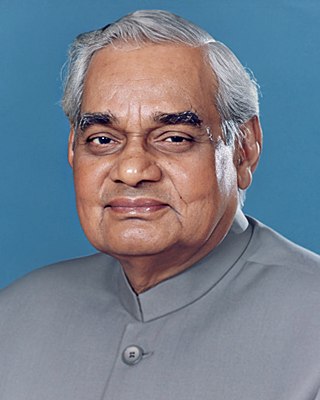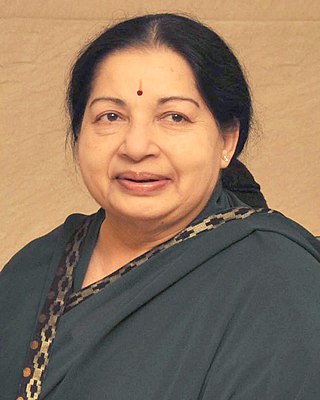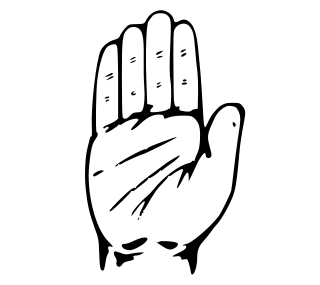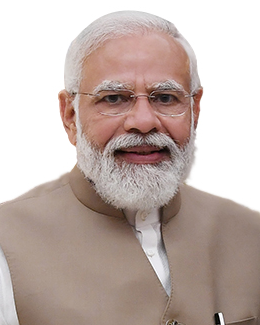
Atal Bihari Vajpayee was an Indian politician and poet who served three terms as the Prime Minister of India, first for a term of 13 days in 1996, then for a period of 13 months from 1998 to 1999, followed by a full term from 1999 to 2004. He was the first non-Congress prime minister to serve a full term in the office. Vajpayee was one of the co-founders and a senior leader of the Bharatiya Janata Party. He was a member of the RSS, a Hindu nationalist volunteer organisation. He was also a Hindi poet and a writer.

The Bharatiya Janata Party is a political party in India and one of the two major Indian political parties alongside the Indian National Congress. Since 2014, it has been the ruling political party in India under the incumbent Prime Minister Narendra Modi. The BJP is aligned with right-wing politics and has close ideological and organisational links to the Rashtriya Swayamsevak Sangh (RSS), a far-right paramilitary organisation. Its policies adhere to Hindutva, a Hindu nationalist ideology. As of January 2024, it is the country's biggest political party in terms of representation in the Parliament of India as well as state legislatures.

Lal Krishna Advani is an Indian politician who served as the 7th Deputy Prime Minister of India from 2002 to 2004. He is one of the co-founders of Bharatiya Janata Party (BJP) and a member of the Rashtriya Swayamsevak Sangh (RSS), a right-wing Hindu nationalist volunteer organization. He is the longest serving Minister of Home Affairs serving from 1998 to 2004. He is also the longest serving Leader of the Opposition in the Lok Sabha. He was the prime ministerial candidate of the BJP during the 2009 general election.

The National Democratic Alliance is a conservative Indian political alliance led by the Bharatiya Janata Party (BJP). It was founded on 15 May 1998 and currently controls the government of India as well as the government of 19 Indian states and one Union territory.
Events in the year 1996 in the Republic of India.

The Janata Party is an unrecognized political party in India. It was founded as an amalgam of Indian political parties opposed to the Emergency that was imposed between 1975 and 1977 by Prime Minister Indira Gandhi of the Indian National Congress. In the 1977 general election, the party defeated the Congress and Janata leader Morarji Desai became the first non-Congress prime minister in independent modern India's history.
The United Front was a coalition government of 13 political parties formed in India after the 1996 general elections. It formed two governments in India between 1996 and 1998. During its tenure, the government was led by two prime ministers belonging to the Janata Dal – H. D. Deve Gowda and I. K. Gujral. N. Chandrababu Naidu of the Telugu Desam Party served as the convener of United Front. The United Front was headquartered at the Andhra Pradesh Bhavan in New Delhi.

General elections were held in India in four phases between 20 April and 10 May 2004. Over 670 million people were eligible to vote, electing 543 members of the 14th Lok Sabha. Seven states also held assembly elections to elect state governments. They were the first elections fully carried out with electronic voting machines.

The 11th Lok Sabha was constituted after April–May 1996 general elections. The result of the election was a hung parliament, which would see three Prime Ministers in two years and force the country back to the polls in 1998. Atal Bihari Vajpayee of Bharatiya Janata Party, the single largest party to win this election, winning 67 more seats than previous 10th Lok Sabha, formed the government which lasted for only 13 days.

General elections were held in India between 5 September and 3 October 1999, a few months after the Kargil War. Results were announced on 6 October 1999.

General elections were held in India on 27 April, 2 May and 7 May 1996 to elect the members of the eleventh Lok Sabha. The elections resulted in a hung parliament with no single party having a clear majority. The Bharatiya Janata Party, which had won the most seats, formed a short-lived government under Prime Minister Atal Bihari Vajpayee. However, two weeks later the United Front coalition was able to secure a parliamentary majority and H. D. Deve Gowda of Janata Dal became Prime Minister. In 1997 Inder Kumar Gujral, also from the United Front, succeeded Gowda as Prime Minister. Due to the instability, early elections were held in 1998. The elections were the first since 1980 in which every states' seats were elected in a single election period.

development in Indian Politics in 1990's

The 1998 Indian general election polls in Tamil Nadu were held for 39 seats in the state. New elections were called when Indian National Congress (INC) left the United Front government led by I. K. Gujral, after they refused to drop the regional Dravida Munnetra Kazhagam (DMK) party from the government after the DMK was linked by an investigative panel to Sri Lankan separatists blamed for the killing of Rajiv Gandhi. The result was a landslide victory for the National Democratic Alliance (NDA) winning 30 seats, which helped result in Atal Bihari Vajpayee being sworn in as the 16th Prime Minister of India. J. Jayalalithaa and the All India Anna Dravida Munnetra Kazhagam, broke off from their long alliance with Indian National Congress and formed an alliance with Bharatiya Janata Party, by joining the National Democratic Alliance. This state proved to be very important in determining the prime minister, since the 18 seats of AIADMK proved valuable for BJP to hold power. That was short-lived, since the AIADMK left the alliance in less than a year, and BJP lost the vote of confidence resulting in fresh elections being called.

Atal Bihari Vajpayee was an Indian politician who served thrice as Prime Minister of India, first from 16 May to 1 June 1996, and then from 19 March 1998 to 22 May 2004. A member of the Bharatiya Janata Party (BJP), Vajpayee was the tenth Prime Minister. He headed the BJP-led National Democratic Alliance in the Indian Parliament, and became the first Prime Minister unaffiliated with the Indian National Congress to complete a full five-year term in office. He died at the age of 93 on Thursday 16 August 2018 at 17:05 at AIIMS, New Delhi.
In Indian politics, the Third Front refers to temporary alliances which began in 1989 among smaller parties to offer a third option to Indian voters. These alliances arose to challenge the Indian National Congress (INC) and Bharatiya Janata Party (BJP).

Bharatiya Janata Party, Rajasthan is a state unit of the Bharatiya Janata Party in Rajasthan. Madan Rathore is the current president of the BJP Rajasthan, succeeding Chandra Prakash Joshi who served the position from 2023–2024. Vasundhara Raje was the previous Chief Minister of Rajasthan during 2013–2018, previously she served in the same post from 2003 to 2008. She was the first female Chief Minister of Rajasthan. And the former president of the BJP Rajasthan.

Legislative Assembly elections were held in the Indian state of West Bengal in 1996. The election took place simultaneously with the 1996 Indian general election. This was the last election Jyoti Basu contested, as he retired from politics in 2000.
Conservatism in India refers to expressions of conservative politics in India. Conservative-oriented political parties have included the Bharatiya Janata Party, the Congress Nationalist Party, and the Uttar Pradesh Praja Party. In addition, a number of figures within the Indian National Congress, such as Sardar Vallabhbhai Patel were conservative.

The Leader of the Bharatiya Janata Party in Parliament is the parliamentary chairperson and representative of the National Executive of the Bharatiya Janata in the Parliament of India.










